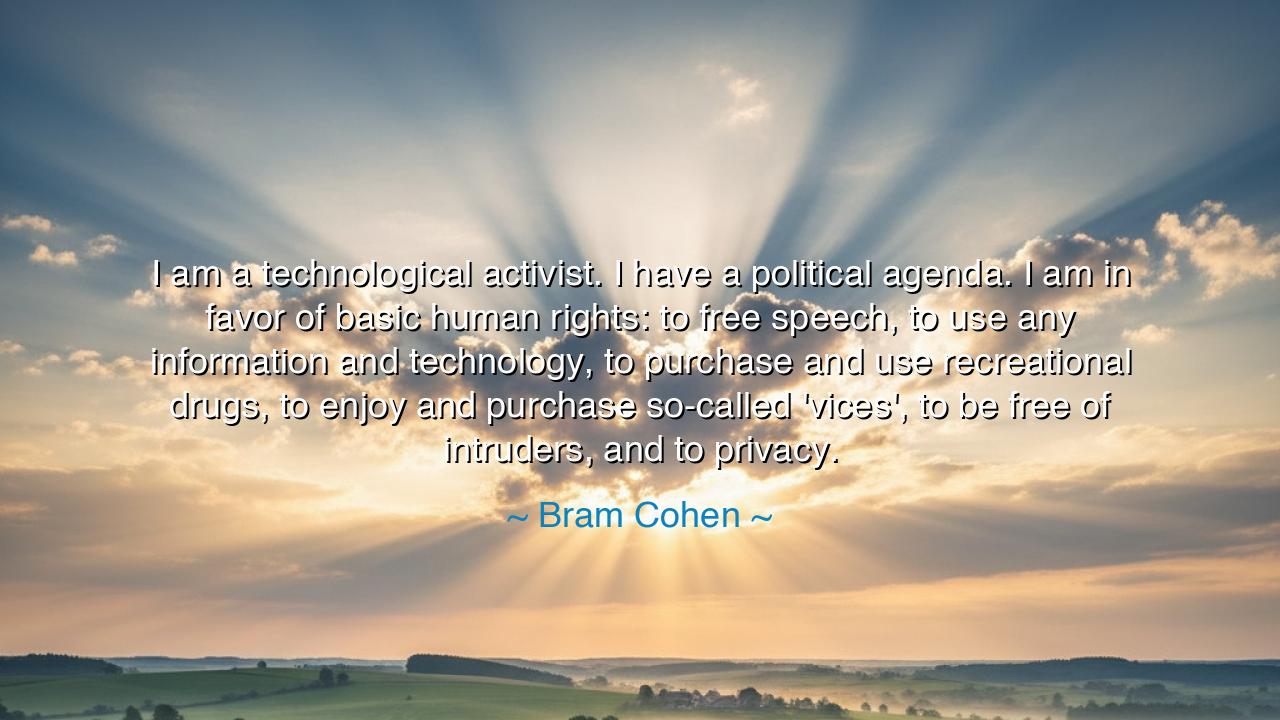
I am a technological activist. I have a political agenda. I am
I am a technological activist. I have a political agenda. I am in favor of basic human rights: to free speech, to use any information and technology, to purchase and use recreational drugs, to enjoy and purchase so-called 'vices', to be free of intruders, and to privacy.






Hear the words of Bram Cohen, creator of BitTorrent and restless spirit of the digital frontier, who proclaimed: “I am a technological activist. I have a political agenda. I am in favor of basic human rights: to free speech, to use any information and technology, to purchase and use recreational drugs, to enjoy and purchase so-called 'vices', to be free of intruders, and to privacy.” These are not light words, nor the boast of an idle dreamer. They are the creed of one who saw the rising power of networks, the entanglement of law and liberty, and declared that technology itself could be a weapon for freedom.
The origin of this saying lies in the dawn of the internet age, when new tools of distribution challenged old systems of control. Bram Cohen, through the invention of BitTorrent, made it possible for vast amounts of data to be shared peer-to-peer, without central authorities to police or profit from every exchange. To some, this was chaos, a threat to entrenched powers. To Cohen, it was liberation—a step toward a world where information flowed freely, where the individual could wield as much strength as the institution. His words reveal a vision: not of technology as neutral, but of technology as an instrument of activism, a banner for those who seek autonomy.
Consider the heart of his list: free speech, access to information, privacy, and the right to live free of coercion. These are not inventions of the internet, but ancient longings of the human spirit. From the Athenian agora to the pamphlets of the Enlightenment, mankind has struggled for the right to speak without chains, to think without censors, to live without constant intrusion. Cohen’s declaration places him in that tradition, but with a modern fire: in a digital world, these rights must not only be defended in courts and parliaments, but also encoded into the very tools we build.
History itself bears witness to this struggle. Recall the invention of the printing press by Gutenberg. With its birth, knowledge escaped the grip of kings and priests, flowing into the hands of ordinary men. Bibles were read in cottages, and ideas of reform sparked revolutions. The printing press was more than a machine; it was an act of rebellion, an activism that changed the balance of power. In the same way, Cohen’s BitTorrent and his words echo this heritage: technology is not just utility, it is a declaration of war against control.
But his creed also touches on the contested, the dangerous—the right to indulge in so-called “vices.” Here, Cohen challenges not only governments but cultural moralities, insisting that autonomy must be real, not selective. To be free, he argues, is to make one’s own choices, even when others call them folly. His list is not the careful declaration of a politician, but the raw cry of one who values liberty above approval. It is the voice of the rebel who sees no justice in the state deciding how a man may live within the privacy of his own life.
The lesson is sharp and enduring: do not wait for institutions to grant your freedoms. If you believe in liberty, then build systems that embody it, live lives that demand it, and defend technologies that preserve it. Understand that power always seeks to control speech, to control knowledge, to control even the smallest habits of your life. And know too that the defense of privacy is not a luxury but a necessity, for without it there can be no true freedom.
So I say to you, O heirs of the digital age: be not passive users of tools, but technological activists in your own right. Use the instruments of your time to defend freedom, to uphold dignity, to carve out spaces of privacy where the spirit may breathe. Build systems that honor truth, share knowledge without fear, and resist the slow creep of control. For Cohen’s words remind us of an eternal truth: that liberty is never gifted—it must be claimed, defended, and woven into the very fabric of the world we create. And if you do this, your technology will not only serve convenience, but will stand as a monument to the unbroken will of the human spirit.






AAdministratorAdministrator
Welcome, honored guests. Please leave a comment, we will respond soon